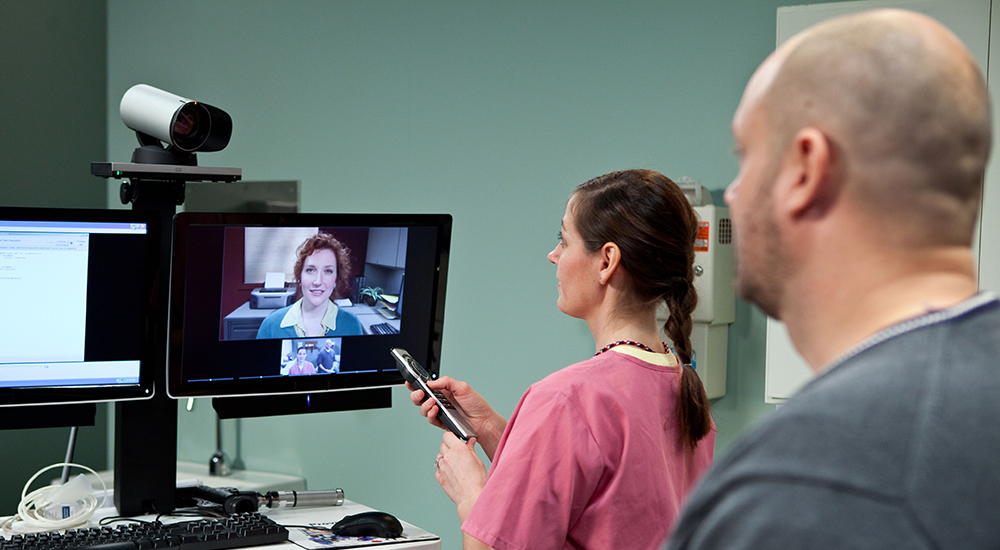The Department of Veterans Affairs is revolutionizing the use of new health care technology to deliver convenient, accessible health care to Veterans. VA’s TeleHealth service is mission critical to the future direction of VA, and utilizes health informatics, disease management and telehealth technologies to care for and provide case management. More importantly, it helps Veterans to continue to live independently; in their own homes, local communities and stay out of the hospital.
“I’ve had nothing but the best experience. I think they saved my life.”
“Technology is the tool the Veteran utilizes through TeleHealth Service to interact with their care coordinator, but the real key component to the success of the program is case management and personal connection,” says Catherine Buck, National Home Telehealth Lead and Clinical Nurse Analyst. “The Veteran establishes a relationship with a go-to person that is essential for the Veteran’s overall health care plan and personal health goals.”
Ultimately, telehealth changes the relationship between patients and their health care team. Higher levels of patient satisfaction and positive clinical outcomes can attest to this.
“VA providers and patients discuss and decide together which telehealth care services are available in their location and clinically appropriate for the patient, said Bay Pines VA Healthcare System’s Virtual Care Program Coordinator,” Rod Miles.

Telehealth practitioner Dr. Paul Maas (foreground) is joined via video by Rod Miles, facility telehealth coordinator at Bay Pines VA Healthcare System.
There are many telehealth resources that are used to deliver care to a patient. However, VA’s Video on Demand has been an important resource for providers and patients at the Bay Pines VA Healthcare System for the past three years.
“Veterans don’t need to be at a clinic to speak with their provider thanks to VA Video on Demand. Providers refer appropriate patients to participate in this program. This telehealth tool is a secure, web-enabled video service, connecting Veterans with their providers using their personal mobile phones or computers, Miles said.
U.S. Army Vietnam Veteran David Miller has been utilizing VA TeleHealth services to assist with the treatment of his diabetes. “I’ve had nothing but the best experience. I think they saved my life. They made dealing with my diabetes much easier. They even gave me a Medtronic device which measures my blood pressure, blood sugar and weight. All I need to do is send my coordinator my results before bed. Telehealth has really helped me to stay on track.”
Another benefit Mr. Miller receives from receiving telehealth care is that he is

Veteran Katrina Pettus utilizing VA Video TeleHealth Technology to connect with TeleHealth Presenter, Demion Young
able to communicate with a pharmacist every couple of weeks to ensure that his medications stay up-to-date with his changing medical needs.
“The overall coordination of my care is more convenient. A pharmacist communicates with me about every three weeks. If there is a need to change what I’m taking, we do it. It makes me feel safe. I’m also about an hour and a half away from the closest VA clinic so; it helps to minimize the number of trips I have to take to see my providers.
“I’d recommend this program to absolutely anyone. They really go above and beyond in making sure that I am cared for and that my health care needs are met. They really know what they’re doing,” Miller said.
About the author: Melanie L. Thomas, MBA, is a public affairs specialist for the Bay Pines VA Healthcare System
Topics in this story
More Stories
Bob Jesse Award celebrates the achievements of a VA employee and a team or department that exemplifies innovative practices within VA.
The Medical Foster Home program offers Veterans an alternative to nursing homes.
Watch the Under Secretary for Health and a panel of experts discuss VA Health Connect tele-emergency care.







Every six months I have to drive from Chattanooga to Nashville, Tennessee for an appointment with an endocrinologist. These appointments could be done via a TV link. This would save the VA funds for my travel and no travel for me.
On one more note, during the Vietnam War, and I needed medical care I was 600 miles round trip to the VA hospital.
Much of this issue has not changed.
Thank you,
Robert L.. Primeaux, Ph.D.
My name is Robert Primeaux, Ph.D., and I just wrote an article in “The Veteran” national magazine for the Vietnam Veterans of America. This Telehealth program might be good for Veterans with computer access, but for the American Indian Veteran this program is no good. I’m an enrolled member of the Standing Rock Sioux Tribe and a 100% Permanent and Total Service Connected Disabled Vietnam Veteran. We as Indian Veterans are isolated on Indian Reservations and most do not have computers which are expensive and we have to travel long distances just to get to our IHS hospitals. Who do not have the methods or knowledge to care for our Veteran disabilites such as PTSD, TBI’s, the many issues of Agent Orange. So, until proper care can be implemented for the American Indian Veteran please do not say what you have done revolutionizes medical care for all Veterans.
Thank you,
Robert L. Primeaux, Ph.D.
How can I sign-up to use this type of care?